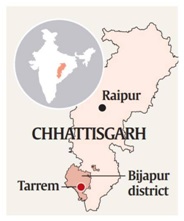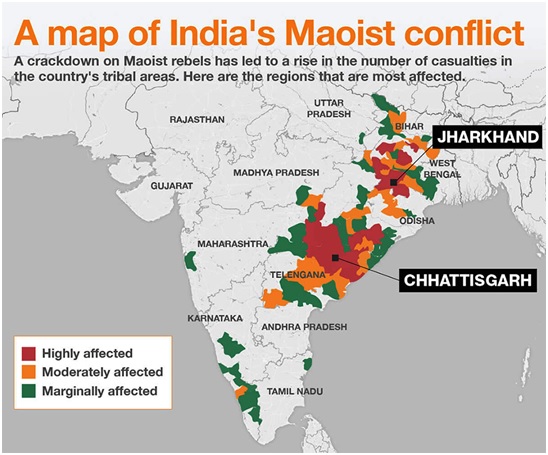

Introduction
Chhattisgarh witnessed one in all the deadliest Naxal attacks in recent times along the border between Bijapur and Sukma districts.
- 22 jawans were killed and 31 were injured in a very deadly four-hour red-terror encounter.
- One jawan was taken as hostage and later released by naxals.
- There was high level meeting held to appear for security situations within the state and plan way ahead.
In this episode, we will discuss issues and challenges related to naxalism issue, policy initiatives taken by government and way forward to tackle the issue from UPSC perspective.
Edited Excerpts from the debate
Details of the Incident:
- The operation was planned to catch their leader Hidma who is mastermind of all attacks in the region. Hidma is known to be ruthless and a master of guerrilla warfare.
- Joint operation was carried out by Chhattisgarh Police Special Task Force and Central Armed Police Force COBRA Battalion.
- When jawans were returning to the base after failed search operation, they were ambushed by Maoists and caught in the situation.
- Villages on the route were empty giving indication that they knew something big was going to happen.
- Maoists occupied heights giving them tactical advantage and causing heavy damage to security forces by attacking with automatic weapons, LMG, AK- 47
- Attack caused casualty of 22, more than 30 injured and one commando taken as hostage.
- They took away sensitive gadgets carried by commandos and also took their weapons and ammunition.

|
COBRA (COmmando Battalion for Resolute Action):
|
Present Situation:
- According to Ministry of Home Affairs, there are 90 districts in India affected by Maoist violence.
- Chhattisgarh, Jharkhand and Orissa to some extent are core states where naxals are being operated.
- They are not able to expand in areas beyond core areas except Western Ghats, where they forms south western region bureau, and in Maharashtra Madhya Pradesh Chhattisgarh Trijunction.
- Maoists are not able to penetrate in newer section of society; they have run out of the issues.
- Maoist leadership is aging, besides it has suffered severe attrition both in leadership and cadre, their attempts for recruitments have also not been successful.
- In the past few years the incidents of LWE(Left Wing Extremism) violence and deaths have come down incidentally, but recent incidence shows threat is far from over.

Challenges in fight against Naxalism:
- Naxals mostly deal with guerrilla warfare technique of hide and fight.
- And to tackle them there needs pin point intelligence gathering about their present location and movement.
- This is very difficult in given circumstances and terrain of deep forest and hilly area.
- Human intelligence getting is very difficult due to no contact between naxals and mainstream population.
- Penetration of espionage into their unit is very difficult and even after penetrating getting information from him is equally challenging task.
- Hence there was reliability on technical intelligence, communication interceptions, image intelligence gathered from gadgets used by forces, but it has hit badly.
- Central Police Forces cannot alone tackle the problems as they lack terrain knowledge and are unknown of local language.
- Maoists have complete hold over area controlled by them in Bastar district. Making it extremely difficult for forces to get into confidence of local population.
Policy adopted to tackle LWE:
- Multi-Pronged Strategy has been adopted to tackle the threat by addressing all possible dimensions. Security aspect as one and development interventions being another part of strategy to counter LWE.
- National Policy and Action Plan 2015 was a well thought strategy in the areas of security, environmental protection by ensuring sustainable development, securing tribal rights etc.
- Government had tried to bring local population into the fight by SalvaJudum But due to judicial intervention was stopped from implementation.
- Rural Road Programs are being conducted to improve road connectivity. Mobile towers are being constructed at a rapid scale to improve contact of tribal population with mainstream society.
Way forward:
- Development at a faster pace would integrate the tribal population into mainstream society and reduce the influence of naxals on them.
- Strictly monitoring the implementationof developmental activities would reduce implementation lacunas and improve service delivery.
- Keeping in mind successful example of Operation Greyhound from Andhra Pradesh anti-Naxal operation, forces should adopt guerrilla warfare same as naxals. Moving thousands troops gives them clear indication of future operations and hence making them well prepared in advance.
- Coordination between Centre and State government shouldimprove across party lines to tackle internal security threat with full force.
- Pin point intelligence gathering with the help of human intelligence and technical intelligence should be improved to avoid future failed attacks and ambushes.
- Surrender and rehabilitation policy should be encouraged to make naxals join main stream and end the conflict in peaceful way.
Value Addition
History of Naxal Movement in India:
- The village Naxalbari of West Bengal gave rise to the term Naxalism.
- It originated as rebellion against local landlords who bashed a peasant over a land dispute. The rebellion was initiated in 1967, with associate objective of rightful distribution of the land to operating peasants with the leadership of KanuSanyal and JaganSanthal.
- Started in West Bengal, the movement has spread across the Eastern India; in less developed areas of states such as Chhattisgarh, Odisha and Andhra Pradesh.
- It is considered that Naxals support Maoist political sentiments and ideology.
- Maoism is a form of communism developed by Mao Tse Tung. It is aideology that supports capture of power through armed rebellion, mass mobilization and strategic alliances.
Causes of Naxal Movement:
- Political Factors
- Nature and apathy of the political system towards tribals remained one amongst the foremost vital factors that led to such uprisings.
- Inability of political authority in India to provide avenues for structural uplift to the deprived sections of society in the affected states.
- Lack of political participation by the tribal community
- Economic Factors
- Poverty and economic inequality and underdevelopment in the naxal affected regions.
- Entry of mining companies in Tribal lands and forests, posing threat to the livelihood of the tribals.
- Indigenous tribal population deprived of their lands, uprooted from their traditional source of livelihood.
- The benefits of the resource exploitation are not passed on the tribals.
- Environmental Degradation
- Environmental degradation in the form of destruction of land and water resources due to mining and industrial activates.
- Lack of basic facilities
- Lack of basic facilities like education, freedom, sanitation and food.
- The socially backward tribals form the major support base for Naxalites because of inequality, illiteracy and lack of opportunities.
Reasons for failure of government initiatives:
1. Governance failure reasons:
- Weak coordination between the States affected - States (both affected and non-affected) restrict their efforts to the defined political boundaries instead of walking the extra mile for better synergy and coordination.
- Inefficient Delivery of Governance - Still, basic and essential services, justice delivery, community participation among others remain elusive to most of the Naxal affected areas of our country.
- Trust Deficit - Locals, especially in Naxal affected areas, are still sceptical and insecure regarding the intentions of the government and security forces.
- Inability to Maintain Created Assets - This weakens the position of both the government and the security forces deployed as it hampers the trust of locals, disrupts channels of communication etc.
- Ineffective Democratic Decentralisation - Half-hearted and weak ground implementation of PESA, provisions of the sixth & fifth schedule and even PRIs has definitely helped in not containing the problem.
|
What is ‘Urban Naxalism’?
|
2. Security failure reasons:
- Role of External States - Role of neighbours and even terrorist organisations has been observed through several reports in accelerating naxalism in India through supply of money and arms by leveraging porous and poorly managed border areas.
- Weak Local Intelligence Gathering - Weakest link in our strategy so far has been timely collection of intelligence and its efficient dissemination.
- Absence of Co-ordinated Proactive Vigilance - Weak coordination between central and state agencies results in the development of security voids captured subsequently by naxals.
- Passive Role of State Police Forces - State police forces have usually not been in the frontline despite of them being well acquainted with the terrain, local community etc.
Government initiatives to tackle LWE:
1. Security Approach:
- SAMADHAN - stands for Smart leadership, Aggressive strategy, Motivation and training, Actionable intelligence, Dashboard Based KPIs (key performance indicators) and KRAs (key result areas), Harnessing technology, an Action plan for each theatre, and No access to financing.
- Police Modernization Scheme in areas affected by Naxal movements.
- Mine Protected Vehicles (MPV) to reduce the number of casualties due to use of IED by the Naxalites.
- Augmenting the strength of Central Armed Police Forces
- Security Related Expenditure (SRE) Scheme:With this the central Govt. reimburses security related expenditure to the LWE affected state Governments with minimum
2. Governance Approach:
- Civic Action Programme - To cover the gaps among local peopleand Security Forces with the tool of personal interaction and bring the human face of SFs before the local population.
- Aspirational District: Monitoring of Aspirational districts programme in 35 LWE affected districts.
- Media Plan: Under the scheme activities like Tribal Youth Exchange programmes organised by NYKS, radio jingles, documentaries, pamphlets etc. are being conducted.
- Bharat Nirman, National Rural Health Mission (NRHM), SarvaShikshaAbhiyan (SSA), Integrated Child Development Services (ICDS) and other income generating and social security schemes of the Ministry of Rural Development, Agriculture, Panchayati Raj and Tribal affairs.
Conclusion:
Through a holistic approach that specialize in development and security connected interventions, the LWE issue will be with success tackled. Civil society and also the media ought to build pressure on the Maoists to avoid violence and recognise the socio-economic and political dynamics and aspirations of twenty first Century India.
More Articles


